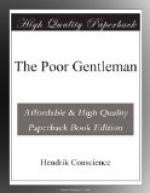“Ah! you would not believe me, sir. Well, let your determination be founded on those papers alone. It is right you should know every thing; for I have determined never again to be tortured. Besides the evidences of debt which are before you, I owe a bill of exchange for four thousand francs, which I cannot pay! You see now, Monsieur Denecker, that I am worse than poor, for I have debts!”
“Alas! it is but too true,” said the stupefied merchant; “you have indeed nothing! I see by these documents that my notary is also yours; and, although I spoke to him of your fortune, he left me unadvised, or, I should rather say, in error.”
De Vlierbeck breathed more freely, for he felt as if a rock had fallen from his breast. His face resumed its ordinary calmness; and, seating himself, he continued:—
“Now, sir, if you have no longer any reason to doubt my poverty, let me ask what are your intentions.”
“My intentions?” replied the merchant; “my intentions are that we shall remain as good friends as we were before; but, as to the marriage, that of course falls to the ground. We will speak no more about it. What were your calculations, Monsieur De Vlierbeck? I think I am just beginning to see a little clearly into this matter! You imagined, I suppose, that you would make a good business out of it and sell your merchandise as high as possible!”
“Sir,” exclaimed De Vlierbeck, bounding from his chair in rage, “speak respectfully of my daughter! Poor or rich, do not dare to forget who she is!”
“Don’t get angry! don’t get angry! Monsieur De Vlierbeck. I have no desire to insult you. Far from it. Had your enterprise succeeded I would probably have admired you; but finesse against finesse always makes a bad game! Permit me to ask, since you are so touchy on the point of honor, if you have acted a very honorable part in courting my nephew and allowing his passion to absorb him?”
De Vlierbeck bowed his head to conceal the blush that suffused his aged cheeks; nor did he awake from his painful stupor till the merchant recalled him by the single word,—
“Well?”
“Ah!” stammered De Vlierbeck, “have mercy on me! Love for my child, probably, led me astray. God endowed her with all the gifts that can adorn a woman. I hoped that her beauty, the purity of her soul, the nobility of her blood, were treasures quite as precious as gold!”
“That is to say, for a gentleman, perhaps; but not for so common a person as a merchant,” interrupted Monsieur Denecker, with a sneer.
“Don’t reproach me with having courted your nephew,” continued De Vlierbeck. “That is a word that wounds me deeply; for it is unjust. Their attachment was reciprocal and in every way unstudied. I thanked God daily in my prayers that he had cast in our path a savior for my child:—yes, a savior, I say; for Gustave is an honorable youth, who would have made her happy not so much by money as by his noble and generous character. Is it then so great a crime for a father who has unfortunately become poor to hope that his child should escape want?”




